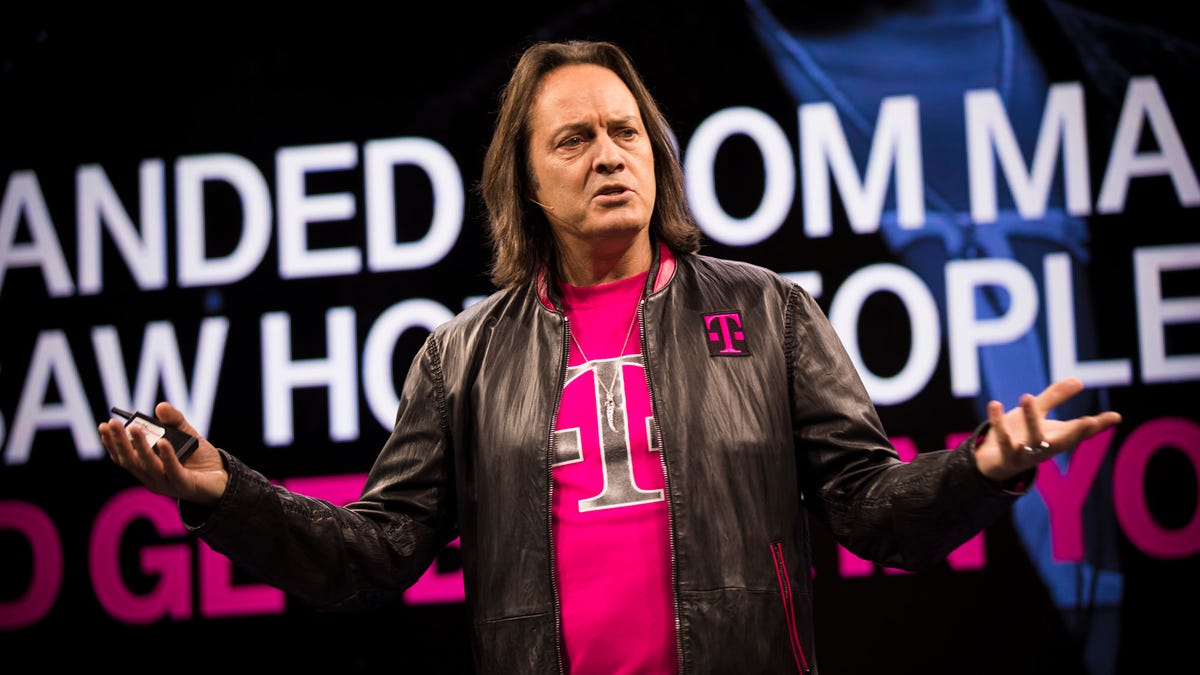T-Mobile grabs more customers than rivals, despite Sprint merger limbo
The Un-carrier is still awaiting approval to buy Sprint, but it's not slowing down.

T-Mobile CEO John Legere.
T-Mobile continues to beat its rivals at attracting new customers, even as it bides its time awaiting regulatory approval for its merger with Sprint . And company executives say they're in the home stretch and confident the deal will close.
The nation's third-largest wireless carrier added a total of 2.4 million new subscribers in the fourth quarter. About 1.4 million of those customers were highly valued postpaid customers, who pay their bills at the end of the month. By contrast, all of T-Mobile's rivals had lackluster quarters, suggesting the company was once again attracting customers from other brands. Verizon added 1.2 million postpaid customers. AT&T added just 134,000 and Sprint lost 26,000.
The results come as scrutiny heats up for T-Mobile on its merger with Sprint. The combination of the companies is expected to shake up the industry, and executives say it will ignite a rapid deployment of next-generation 5G networking throughout the US. But Washington isn't so sure that consolidating the market will be in the best interest of consumers. Critics of the deal say it could lead to higher prices and fewer choices.
CEO John Legere recently reiterated in a letter to the Federal Communications Commission, which along with the Department of Justice will decide the fate of the merger, that he promises prices will not go up following the merger. And on a call with investors Thursday, following the company's fourth-quarter earnings announcement, he said he's more certain than ever that the deal will be approved in the first half of the year.
"The combined company will create an aggressive competitor and will result in lower prices for consumers and create jobs starting day one," he said on the call. He added that the company is continuing to work through the regulatory process with "humility." And he's "optimistic and confident" that once regulators review all the facts, they'll agree and approve the deal.
Legere downplayed speculation that the deal may be in hot water with regulators. He criticized a note to investors from New Street Research that said his letter to the FCC signaled bad news for the deal.
That letter, he said, was simply to reiterate that the deal would lower prices and create jobs.
"Sometimes it's just better to announce and document," he said. "If you want clarification, I'm your man. I'll raise my right hand and I'll tell you."
T-Mobile's Washington efforts
Still, it's clear that T-Mobile is stepping up its lobbying efforts. The company has hired former FCC commissioner Mignon Clyburn, a Democrat and a champion of consumer causes, to help get the deal approved. Clyburn opposed AT&T's attempt to acquire T-Mobile in 2011, but she said in an interview with CNET that she believes the Sprint merger will result in 5G getting to more people throughout the country, including in rural and underserved communities.
Legere and Sprint's executive chairman, Marcelo Claure, will testify next week before a joint hearing of the House Energy and Commerce and Judiciary committees. Democrats leading these committees say they need more information about how the merger will affect "jobs, costs to consumers, innovation and competition."
In June, Legere and Claure testified before the Senate Judiciary Committee, but Democrats on the Commerce Committee also say they have concerns. Sens. Ed Markey of Massachusetts, Richard Blumenthal of Connecticut, Tammy Baldwin of Wisconsin and Amy Klobuchar of Minnesota sent a letter last month requesting a hearing on the merger.
"This reduction in competition raises a number of important questions that the committee should address," they said in their letter.
There's also been concern among some Democrats over T-Mobile's use of the Trump International Hotel in Washington. On Wednesday, the Washington Post published an article saying T-Mobile executives stayed at the Trump hotel at least 52 times since seeking the Trump administration's approval for the merger.
On Wednesday, Sen. Elizabeth Warren, of Massachusetts and Rep. Pramila Jayapal, of Washington, sent a letter to Legere asking for more information about these stays.
"I answered the letter in 5 minutes," Legere said in an interview with CNET. "I want to be respectful of senators asking questions, but there is no there there."
Legere said T-Mobile chooses which hotels executives stay in for a variety of reasons, including proximity to where they have meetings, security and amenities. He said he's happy to share information with lawmakers and others interested in looking at where he has stayed while in Washington.
"We are in the bottom of the ninth inning in a very long process," Legere said in an interview. "Anything associated with us right now is going to come up, and I'm not going to be distracted by it. I'm going to treat all the questions respectfully."
For the fourth quarter, which ended Dec. 31, T-Mobile reported earnings of 75 cents per share on revenue of $11.4 billion, up from $10.7 billion in the year-ago period.
At midday Thursday, shares of T-Mobile were trading at about $67.35, up 44 cents or less than 1 percent.
First published at 5:23 a.m. PT.
Update, 8:48 a.m. PT: Adds executives' comments and background information.
Say hello to Visible: Verizon's stealth budget wireless service may finance your next iPhone.
5G smartphone on the way: Samsung and Verizon are teaming up to deliver it in first half of 2019.

